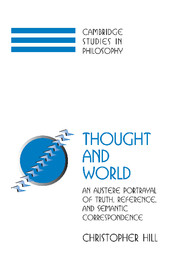Book contents
- Frontmatter
- Contents
- Acknowledgments
- 1 Introduction
- 2 Truth in the Realm of Thoughts
- 3 The Marriage of Heaven and Hell: Reconciling Deflationary Semantics with Correspondence Intuitions
- 4 Indexical Representation and Deflationary Semantics
- 5 Why Meaning Matters
- 6 Into the Wild Blue Yonder: Nondesignating Concepts, Vagueness, Semantic Paradox, and Logical Paradox
- Notes
- Index
5 - Why Meaning Matters
Published online by Cambridge University Press: 07 December 2009
- Frontmatter
- Contents
- Acknowledgments
- 1 Introduction
- 2 Truth in the Realm of Thoughts
- 3 The Marriage of Heaven and Hell: Reconciling Deflationary Semantics with Correspondence Intuitions
- 4 Indexical Representation and Deflationary Semantics
- 5 Why Meaning Matters
- 6 Into the Wild Blue Yonder: Nondesignating Concepts, Vagueness, Semantic Paradox, and Logical Paradox
- Notes
- Index
Summary
The present chapter is concerned with questions about the practical and theoretical utility of semantic concepts.
Questions that are concerned with the utility of truth have received a great deal of attention in the literature, and there are several well developed explanations of its utility in the field. We took note of one of these explanations in Chapter 2, when we considered W. V. Quine's suggestion that truth is useful primarily because it provides us with the ability to make indefinite and generalized endorsements. According to Quine, if we find truth indispensable, this is because it enables us to affirm thoughts that we are unwilling or unable to formulate explicitly, as when we express agreement with Fermat's Last Theorem by thinking that the Theorem is now widely accepted, and is therefore probably true, and because it enables us to affirm simultaneously all of the members of large (and possibly infinite) collections of thoughts, as when we affirm that all of the propositions that follow from General Relativity have turned out to be more or less true.
Now as I see it, Quine has identified the main functions of the concept of truth: other authors have identified additional functions, but these additional functions can generally be seen to presuppose, in one way or another, the Quinean functions. Accordingly, I propose here to set questions about the utility of truth aside, and to focus on questions about the utility of our relational semantic concepts – that is, of reference, denotation, semantic correspondence, and their fellows.
- Type
- Chapter
- Information
- Thought and WorldAn Austere Portrayal of Truth, Reference, and Semantic Correspondence, pp. 89 - 108Publisher: Cambridge University PressPrint publication year: 2002



